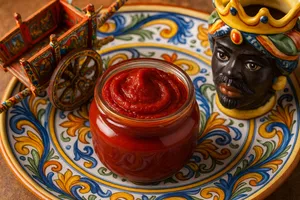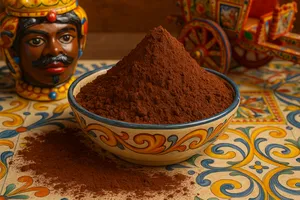Overview
The stock cube is a concentrated food preparation used to quickly make broths and soups, or to flavour various dishes. Industrially produced in the form of cubes, granules or powder, it contains meat or vegetable extracts, salt, vegetable fats, aromas and flavour enhancers. Although not part of classic Sicilian culinary tradition, which favoured homemade broth prepared with fresh ingredients, the stock cube spread across the island during the twentieth century as a practical, time-saving solution suited to modern life.
In contemporary Sicilian cooking, the stock cube is mainly used as a quick alternative to homemade broth, especially in everyday preparations when time is limited. However, traditional cooks and chefs devoted to authentic Sicilian cuisine still prefer broth prepared with fresh ingredients, considered irreplaceable for flavour, genuineness and nutritional quality.
Characteristics
The stock cube typically comes in cubes of about 10 grams, individually wrapped in foil, or in granular or powdered form packaged in jars or sachets. The colour ranges from golden yellow for vegetable cubes to brown for meat ones. The texture is solid and crumbly for cubes, granular or powdery for other formats.
The flavour is intense, salty and savoury, with notes reminiscent of meat or vegetables depending on the type, yet with an artificial character due to flavour enhancers such as monosodium glutamate. The aroma is strong and penetrating, instantly recognisable.
Stock cubes dissolve completely in hot water, releasing flavour and colour. One cube is generally measured for 500 ml of water, though the quantity may be reduced to limit salt intake.
Types
Meat stock cube
Contains beef extracts, salt, vegetable fats, aromas and flavour enhancers. It has a more intense, full-bodied flavour. It is the most traditional type and used for preparations requiring a meat base.
Vegetable stock cube
Made with vegetable extracts, salt, vegetable fats and aromas. It has a more delicate flavour compared with the meat version. Suitable for vegetarians and vegans, and preferred for lighter preparations.
Fish stock cube
Contains fish extracts, salt and aromas. It has a distinctive marine flavour. Used for fish soups, seafood risottos and fish dishes when there is no time to prepare a fresh fish stock.
Granular stock
The granular or powdered version allows more precise dosing than cubes. More practical and versatile for seasoning individual dishes.
Organic stock cube
Made with ingredients from organic farming, without monosodium glutamate or artificial flavour enhancers. It has a more natural but less intense flavour. It is the preferable choice for those seeking greater genuineness.
Culinary uses
In modern Sicilian cooking, the stock cube is used in several preparations.
Soups and broths
The cube is dissolved in boiling water to quickly create a base broth for soups of pasta, rice or legumes. This is the most common substitute for homemade broth when time is short.
Risottos
It is added to the cooking water of risotto to provide flavour. Some cooks also use it when deglazing the rice together with wine.
Sauces and stews
A small piece of cube can be added to meat sauces, braises or stews to intensify flavour. It should be used sparingly to avoid overpowering the natural taste of the ingredients.
Cooking vegetables
The cooking water for vegetables may be enhanced with a little vegetable cube to add flavour.
Seasoning
Granular stock is sometimes used as a direct seasoning on vegetables, potatoes or other side dishes, replacing salt to increase savouriness.
Correct use
To use the stock cube correctly, dissolve it completely in boiling water while stirring well. The standard dosage is one cube (about 10 grams) per 500 ml of water, though it is advisable to reduce the quantity to half a cube to limit salt intake and overly artificial flavour.
It is important not to add extra salt before tasting, as the cube is already very salty. The cube should be added at the beginning of cooking to allow its flavour to blend with the other ingredients.
For those seeking a more natural result, it is possible to combine a pinch of cube with homemade broth, or use it only to “adjust” a homemade broth that turns out less flavourful.
Healthier alternatives
In authentic Sicilian tradition, there are more genuine and healthier alternatives to industrial stock cubes.
Homemade broth
Broth prepared with meat, bones, vegetables and natural aromatics is irreplaceable for flavour and quality. It can be prepared in large quantities and frozen in portions for future use.
Homemade meat extract
A very concentrated broth obtained from the long cooking of meat and bones, reduced to a dense consistency. It is kept in the refrigerator and used in small amounts.
Homemade stock cube
It can be prepared by blending vegetables, salt and herbs, then drying the mixture and storing it. It is completely natural and free from additives.
Dried mushroom powder
Dried porcini mushrooms ground into powder are an excellent natural flavour enhancer for broths, sauces and risottos, traditionally used in Sicily.
Storage
Packaged stock cubes keep at room temperature in a cool, dry place, protected from humidity, for the duration indicated on the package, generally 1–2 years. Individual cubes should be kept in their foil wrapping until use.
Granular or powdered stock should be stored in airtight containers after opening to prevent moisture absorption and clumping. It is important to check the expiry date and avoid using expired products that may have lost their organoleptic qualities.
Once dissolved in water, broth prepared with stock cubes keeps in the refrigerator for 2–3 days in a sealed container, or it may be frozen in portions.
Purchase tips
When buying stock cubes, read the label carefully and check the ingredients. Choose products with recognisable natural ingredients (meat or vegetable extracts, salt, spices) and avoid those with long lists of additives, artificial colourings and hydrogenated fats.
Check for the presence and amount of monosodium glutamate (E621) or other flavour enhancers. It is better to choose organic products or those labelled “glutamate-free” if you wish to avoid this controversial additive.
Check the salt content: some cubes contain over 50% salt, making it easy to exceed recommended sodium intake. Choose low-salt products when available.
Organic cubes or those with quality certifications are generally preferable, even if more expensive, because they contain better ingredients and no artificial additives.
Nutritional aspects
The stock cube has an unfavourable nutritional profile. It is extremely high in sodium: one 10-gram cube can contain 4–5 grams of salt, nearly the entire recommended daily intake. Excess sodium is associated with hypertension and cardiovascular problems.
It contains fats, generally of vegetable origin, which may be saturated. Some products contain hydrogenated fats, harmful to health. Protein content is minimal despite the presence of meat extracts.
Flavour enhancers such as monosodium glutamate, though considered safe by health authorities in normal doses, are debated. Some people report sensitivity to these additives.
The stock cube does not provide significant vitamins or minerals beyond excess sodium. From a nutritional perspective, homemade broth prepared with fresh ingredients is vastly superior, offering minerals, amino acids and valuable nutrients.
Considerations on tradition
In traditional Sicilian cooking, the stock cube is an unfamiliar ingredient. Sicilian grandmothers prepared broth with chicken, beef, fresh vegetables and natural aromatics, allowing it to cook for hours to obtain a rich, fragrant and nutritious liquid. This broth was the base for soups, risottos and many other dishes.
Homemade “brodu” (broth) was considered a precious, almost medicinal food, given to the ill and to those recovering for its nourishing and restorative properties. No cube could ever replace the authentic flavour and benefits of homemade broth.
Even today, in Sicilian families that maintain culinary tradition, broth is prepared at home, often on Sunday mornings, and used throughout the week. The aroma of simmering broth is part of the childhood memories of many Sicilians.
Sicilian chefs and restaurants serving authentic traditional cuisine never use industrial stock cubes, considering them incompatible with the philosophy of Sicilian cooking based on fresh, genuine, high-quality ingredients.
Curiosities
The first stock cube was invented in 1840 by the German chemist Justus von Liebig, who developed a concentrated meat extract. Industrial-scale production began at the start of the twentieth century, and the product spread rapidly across Europe.
In Sicily, the stock cube arrived in the post-war period along with other industrial products that promised convenience and modernity. At first it was met with suspicion by traditional housewives, but gradually spread as lifestyles changed.
In the 1960s and 1970s, the stock cube was promoted through massive advertising campaigns that presented it as a symbol of modernity and convenience, in contrast to traditional methods considered outdated. This contributed to its spread even in Sicilian kitchens.
Today there is a movement back towards tradition: more and more home cooks and professionals are rediscovering the value of homemade broth, considering the stock cube a product to avoid or use only in exceptional cases when time is short.











